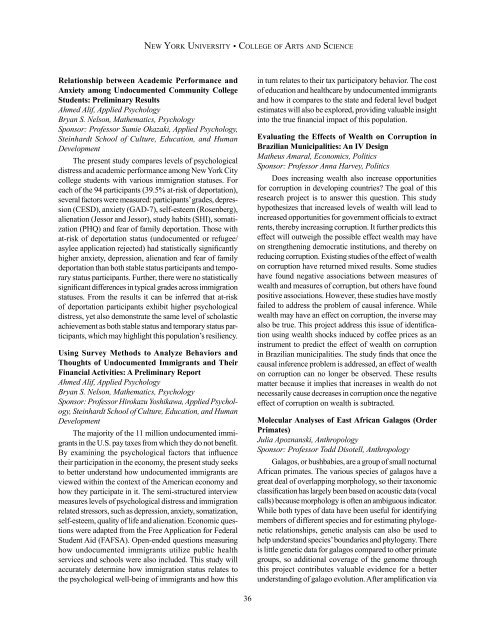INQUIRY
InquiryXIX
InquiryXIX
Create successful ePaper yourself
Turn your PDF publications into a flip-book with our unique Google optimized e-Paper software.
New York University • College of Arts and Science<br />
Relationship between Academic Performance and<br />
Anxiety among Undocumented Community College<br />
Students: Preliminary Results<br />
Ahmed Alif, Applied Psychology<br />
Bryan S. Nelson, Mathematics, Psychology<br />
Sponsor: Professor Sumie Okazaki, Applied Psychology,<br />
Steinhardt School of Culture, Education, and Human<br />
Development<br />
The present study compares levels of psychological<br />
distress and academic performance among New York City<br />
college students with various immigration statuses. For<br />
each of the 94 participants (39.5% at-risk of deportation),<br />
several factors were measured: participants’ grades, depression<br />
(CESD), anxiety (GAD-7), self-esteem (Rosenberg),<br />
alienation (Jessor and Jessor), study habits (SHI), somatization<br />
(PHQ) and fear of family deportation. Those with<br />
at-risk of deportation status (undocumented or refugee/<br />
asylee application rejected) had statistically significantly<br />
higher anxiety, depression, alienation and fear of family<br />
deportation than both stable status participants and temporary<br />
status participants. Further, there were no statistically<br />
significant differences in typical grades across immigration<br />
statuses. From the results it can be inferred that at-risk<br />
of deportation participants exhibit higher psychological<br />
distress, yet also demonstrate the same level of scholastic<br />
achievement as both stable status and temporary status participants,<br />
which may highlight this population’s resiliency.<br />
Using Survey Methods to Analyze Behaviors and<br />
Thoughts of Undocumented Immigrants and Their<br />
Financial Activities: A Preliminary Report<br />
Ahmed Alif, Applied Psychology<br />
Bryan S. Nelson, Mathematics, Psychology<br />
Sponsor: Professor Hirokazu Yoshikawa, Applied Psychology,<br />
Steinhardt School of Culture, Education, and Human<br />
Development<br />
The majority of the 11 million undocumented immigrants<br />
in the U.S. pay taxes from which they do not benefit.<br />
By examining the psychological factors that influence<br />
their participation in the economy, the present study seeks<br />
to better understand how undocumented immigrants are<br />
viewed within the context of the American economy and<br />
how they participate in it. The semi-structured interview<br />
measures levels of psychological distress and immigration<br />
related stressors, such as depression, anxiety, somatization,<br />
self-esteem, quality of life and alienation. Economic questions<br />
were adapted from the Free Application for Federal<br />
Student Aid (FAFSA). Open-ended questions measuring<br />
how undocumented immigrants utilize public health<br />
services and schools were also included. This study will<br />
accurately determine how immigration status relates to<br />
the psychological well-being of immigrants and how this<br />
in turn relates to their tax participatory behavior. The cost<br />
of education and healthcare by undocumented immigrants<br />
and how it compares to the state and federal level budget<br />
estimates will also be explored, providing valuable insight<br />
into the true financial impact of this population.<br />
Evaluating the Effects of Wealth on Corruption in<br />
Brazilian Municipalities: An IV Design<br />
Matheus Amaral, Economics, Politics<br />
Sponsor: Professor Anna Harvey, Politics<br />
Does increasing wealth also increase opportunities<br />
for corruption in developing countries? The goal of this<br />
research project is to answer this question. This study<br />
hypothesizes that increased levels of wealth will lead to<br />
increased opportunities for government officials to extract<br />
rents, thereby increasing corruption. It further predicts this<br />
effect will outweigh the possible effect wealth may have<br />
on strengthening democratic institutions, and thereby on<br />
reducing corruption. Existing studies of the effect of wealth<br />
on corruption have returned mixed results. Some studies<br />
have found negative associations between measures of<br />
wealth and measures of corruption, but others have found<br />
positive associations. However, these studies have mostly<br />
failed to address the problem of causal inference. While<br />
wealth may have an effect on corruption, the inverse may<br />
also be true. This project address this issue of identification<br />
using wealth shocks induced by coffee prices as an<br />
instrument to predict the effect of wealth on corruption<br />
in Brazilian municipalities. The study finds that once the<br />
causal inference problem is addressed, an effect of wealth<br />
on corruption can no longer be observed. These results<br />
matter because it implies that increases in wealth do not<br />
necessarily cause decreases in corruption once the negative<br />
effect of corruption on wealth is subtracted.<br />
Molecular Analyses of East African Galagos (Order<br />
Primates)<br />
Julia Apoznanski, Anthropology<br />
Sponsor: Professor Todd Disotell, Anthropology<br />
Galagos, or bushbabies, are a group of small nocturnal<br />
African primates. The various species of galagos have a<br />
great deal of overlapping morphology, so their taxonomic<br />
classification has largely been based on acoustic data (vocal<br />
calls) because morphology is often an ambiguous indicator.<br />
While both types of data have been useful for identifying<br />
members of different species and for estimating phylogenetic<br />
relationships, genetic analysis can also be used to<br />
help understand species’ boundaries and phylogeny. There<br />
is little genetic data for galagos compared to other primate<br />
groups, so additional coverage of the genome through<br />
this project contributes valuable evidence for a better<br />
understanding of galago evolution. After amplification via<br />
36


